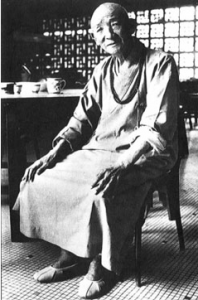Buddhism in Singapore-China Relations: Venerable Hong Choon and His Visits, 1982-1990
July 2, 2021

Existing literature on Singapore-China relations since the reopening of China in the late 1970s has generally been based on political relations and economic and trade co-operation, with no existing literature having explored the role of religion or Buddhism in particular.
In “Buddhism in Singapore-China Relations: Venerable Hong Choon and His Visits, 1982 – 1990” (The China Quarterly, 2008), Assistant Professor Jack Meng-Tat Chia (NUS Department of History) writes about the diplomatic significance of the eight visits Venerable Hong Choon made to the People’s Republic of China between 1982 and 1990, in the open-door era where there was a relaxation of religious policy and a revival of Buddhism. He argues that within the context of China’s reopening in the late 1970s, Buddhism played a role in fostering international relations between Singapore and China. Since these visits took place when no official diplomatic ties existed between the two countries, Dr Chia asserts that Venerable Hong Choon’s religious visits can be considered a form of informal diplomacy which served for China to build greater confidence in their relationship with Singapore.
The contributory role of Buddhism in Singapore-China relations was examined through a range of Buddhist publications from both Singapore and China, with the most important source being the Special Commemorative Volume in Memory of Venerable Hong Choon. In addition, Dr Chia conducted informal and loosely structured interviews which provided greater breath than written sources. Research was also conducted at the Venerable Hong Choon Museum at KMSPKS.
Venerable Hong Choon was the president of the Singapore Buddhist Federation (SBF) and the Abbot of Kong Meng San Phor Kark See (KMSPKS). During his visits to China, the first one taking place in July 1982, he met national and religious leaders, made pilgrimages to sacred Buddhist sites, helped restore the monasteries associated with his master Venerable Hui Quan, and officiated at religious ceremonies. Chinese political and religious leaders viewed Venerable Hong Choon as the key Singaporean religious representative who was able to foster religious ties between the two countries in the absence of official diplomatic relations.
In 1988, Venerable Hong Choon invited Zhao Puchu, the chairman of the China Buddhist Association (CBA) and vice-chairman of the Chinese People’s Political Consultative Conference (CPPCC), to Singapore, where he and a CBA delegation had audiences with prominent Singaporean political and religious leaders. This visit was considered groundbreaking as it was the CBA’s first religious exchange to Singapore since its founding, and could be regarded as China’s effort to reciprocate Venerable Hong Choon’s earlier visits. Though Venerable Hong Choon had invited Zhao Puchu to Singapore on a supposedly religious visit, the visit also turned out to be political due to Zhao’s status as vice-chairman of the CPPCC.
In 1990, Singapore and China established formal diplomatic relations and Venerable Hong Choon passed away. The nine years of mutual religious exchanges contributed to the cordial relationship between Singapore and China, and especially between the two countries’ Buddhist organisations. Therefore, Dr Chia maintains that the role of religion and Buddhism in particular should not be overlooked in the relations between Singapore and China. Despite the Singapore government’s initial apathy towards Venerable Hong Choon’s visits to China, Zhao Puchu’s visit to Singapore was met with hospitality, showing that the Singapore government was prepared to bring a religious dimension into its foreign policy, by allowing unofficial foreign relations to exist alongside official political and economic ones.
Read the article here.
